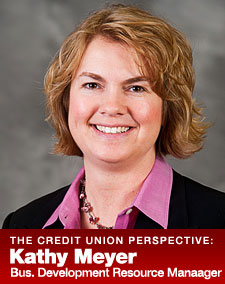 Banks have long dominated the lending arena so it makes sense to start with that perspective. The level of sophistication in terms of actual processes as well as the marketing of loan products can often be discouraging to credit unions and smaller community banks — particularly with bringing new or revamped lending products to market.
Banks have long dominated the lending arena so it makes sense to start with that perspective. The level of sophistication in terms of actual processes as well as the marketing of loan products can often be discouraging to credit unions and smaller community banks — particularly with bringing new or revamped lending products to market.
Auto loans have been one highlight for the credit union industry as of late. According to CUNA Mutual Group’s Credit Union Trends Report, 72% of 2012’s annual gains for the industry came from auto loans. David Dodson, credit union vice president for TransUnion’s financial services business unit was quoted in a TransUnion CUNA survey saying, “Many credit unions are seeing that auto loans will offer great revenue opportunities, particularly since delinquencies continue to stay near historic lows.”
One place banks have been particularly successful without credit union competition has been in small business lending. Small business loans have caught the eye of various credit unions looking to increase loan volumes in our still-recovering economy. Can credit unions and banks play nice in the same business lending sandbox? It’s certainly possible. Generally competition is always better for the consumer and in this case, businesses could benefit from a lending-friendly environment. The more businesses that purchase equipment or hire staff, the more our economy improves, and financial institutions from both sides of the fence can certainly agree that a healthy economy is positive for all.
In the small business space, credit unions are typically competing with smaller banks, not the behemoths chasing complex credit structures and very large opportunities. According to NuWireTM Investor, an alternative investment media source, “small banks are aggressively increasing their SBA lending, says Biz2Credit CEO Rohit Arora. Small-business loan approval rates by banks with less than $10 billion in assets reached a record high of 50.8% last month, according to Biz2Credit’s monthly lending index.”
So what do credit unions have to learn from banks?
- Automate the selling process and generate leads. Banks want to sell. Credit unions often shy away from selling. This will likely be a common theme throughout this series: create a sales culture. Credit union leadership teams need to incentivize sales and demonstrate to their employees how the credit union can help members by providing them the right products and services (in this case loans) at the right time.
- Make lending convenient. We’re talking technology here. Online applications. Mobile applications. Electronic signatures. Yes, there is an investment, but in the long-run, you’ll save on not having to provide these services through an expensive branch delivery model.
Read More: What Banks & Credit Unions Can Learn From Each other: Content Marketing

The Power of Localized Marketing in Financial Services
Learn how to enhance your brand’s local visibility, generate more leads, and attract more customers, all while adhering to industry regulations and compliance.
Read More about The Power of Localized Marketing in Financial Services

Send the Right Offers to the Right Consumers
Achieve a better return on your marketing investment. Leverage behavioral data and analytics to target the right customers with the best possible offers.
Read More about Send the Right Offers to the Right Consumers
A Credit Union’s Take on Lending: Make It Personal, Keep It Local
 As the economy improves, financial institutions are increasingly hungry to write loans—from shoring up home refinancing loans before the current rate environment disappears to making a play for small businesses ready to grow.
As the economy improves, financial institutions are increasingly hungry to write loans—from shoring up home refinancing loans before the current rate environment disappears to making a play for small businesses ready to grow.
Small businesses are often seen as an economic bellwether—the sound of an improving economic environment. What’s changed since the recession began is a growing interest among credit unions to get into the small business lending game. And why not? Credit unions have a rich history of serving the needs of everyday consumers with lower loan rates and better savings rates. If the industry can extend those services to small businesses, it might help fuel an economic rebound.
With banks and credit unions at odds over whether Congress should increase the cap on credit union business lending above the current threshold at 12.25% of assets, we don’t intend to make a suggestion as to how banks should approach this potential influx of competition.
However, we do have some suggestions as to what banks can learn from credit unions when it comes to lending.
- Make it personal. Credit unions see lending as part of a total relationship. Community banks are often able to do this, but the bigger the bank, the harder this concept becomes to truly execute.
Beyond making it personal, it can be valuable to make local credit decisions whenever possible. If you’re a national or regional bank, there are obvious benefits to consolidation, but moving further and further away from the relationship can mean positive attributes of creditworthiness might be overlooked. Given the recent economy, a loan prospect might look better on paper when other attributes are considered. When you empower your people and take some of the red tape away, you might be building a customer for life.
About the Authors
Jen Joly is the Marketing and Communications Director for BlueSpire Strategic Marketing in Minneapolis. Before Joly joined BlueSpire, she spent five years in bank marketing following her start in the gaming industry (she adds these are “very similar industries, believe it or not!”). She is currently the president of IABC Minnesota and has spoken at the CUNA Marketing & Business Development Council’s Conference.
Kathy Meyer is a Business Development Resource Manager with a focus on the credit union industry for BlueSpire Strategic Marketing. Meyer has more than 11 years of experience working with credit unions, has spoken at the CUNA Marketing & Business Development Council’s Conference and has also been honored to judge the Texas Credit Union League’s “Lone Star Awards” and the CUNA Marketing & Business Development Council’s “Diamond Awards.”







